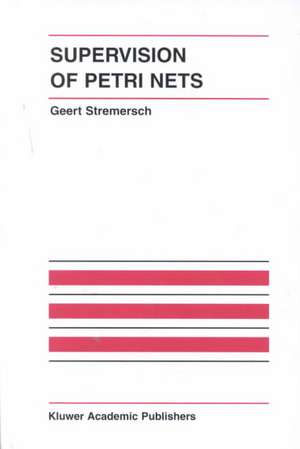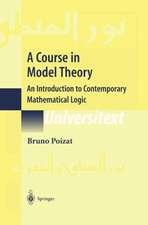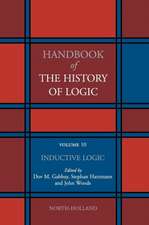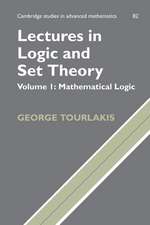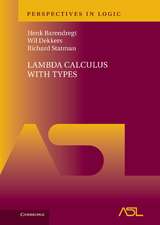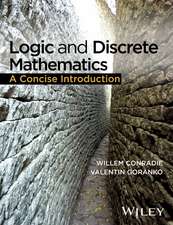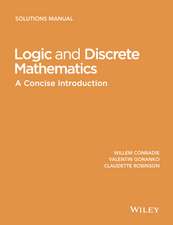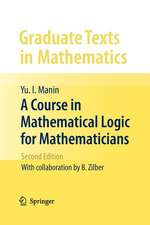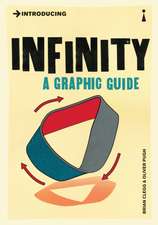Supervision of Petri Nets: The International Series on Discrete Event Dynamic Systems, cartea 13
Autor Geert Stremerschen Limba Engleză Hardback – 30 sep 2001
Supervision of Petri Nets introduces a new and mathematically sound approach to the subject. Existing results are unified by proposing a general mathematical language that makes extensive use of order theoretical ideas, and numerous new results are described, including ready-to-use algorithms that construct supervisory control laws for Petri nets.
Supervision of Petri Nets is an excellent reference for researchers, and may also be used as a supplementary text for advanced courses on control theory.
| Toate formatele și edițiile | Preț | Express |
|---|---|---|
| Paperback (1) | 1267.63 lei 43-57 zile | |
| Springer Us – 24 oct 2012 | 1267.63 lei 43-57 zile | |
| Hardback (1) | 1273.92 lei 43-57 zile | |
| Springer Us – 30 sep 2001 | 1273.92 lei 43-57 zile |
Preț: 1273.92 lei
Preț vechi: 1592.40 lei
-20% Nou
Puncte Express: 1911
Preț estimativ în valută:
243.76€ • 255.19$ • 201.70£
243.76€ • 255.19$ • 201.70£
Carte tipărită la comandă
Livrare economică 07-21 aprilie
Preluare comenzi: 021 569.72.76
Specificații
ISBN-13: 9780792374862
ISBN-10: 079237486X
Pagini: 198
Ilustrații: XIV, 198 p.
Dimensiuni: 155 x 235 x 14 mm
Greutate: 0.48 kg
Ediția:2001
Editura: Springer Us
Colecția Springer
Seria The International Series on Discrete Event Dynamic Systems
Locul publicării:New York, NY, United States
ISBN-10: 079237486X
Pagini: 198
Ilustrații: XIV, 198 p.
Dimensiuni: 155 x 235 x 14 mm
Greutate: 0.48 kg
Ediția:2001
Editura: Springer Us
Colecția Springer
Seria The International Series on Discrete Event Dynamic Systems
Locul publicării:New York, NY, United States
Public țintă
ResearchCuprins
1. The Petri Net Model.- 1 Discrete event systems.- 2 Notation.- 3 Order theoretical preliminaries.- 4 Petri net definition.- 5 Petri nets as discrete event system models.- 6 Reachable sets.- 7 Graphical representation.- 8 Reachability via subsets of transitions.- 9 Other concurrency assumptions.- 10 A general Petri net definition.- 11 Notes and references.- 2. Supervisory Control.- 1 Control goal and architecture.- 2 Formal definition.- 3 Reachable sets under supervision.- 4 Maximally permissive control laws.- 5 Specific control sets.- 6 Linear inequalities as a legal set.- 7 Control design under the no concurrency assumption.- 8 Notes and references.- 3. Uncontrollable Events And Transitions.- 1 Introduction.- 2 Supervisory control laws.- 3 Specific concurrency and control assumptions.- 4 Maximally permissive control laws.- 5 Control design.- 6 The supremal controllable subset.- 7 Notes and references.- 4. Reduction Theorems.- 1 Intuition for A*.- 2 Invariance properties of the legal set.- 3 Sets of places and transitions.- 4 Reduction result for A*.- 5 Reduction of the control design.- 6 Structural and invariance properties of the legal set.- 7 Notes and references.- 5. Acyclic Petri Nets.- 1 Partitioning of the sets of places and transitions.- 2 Structure of the incidence matrices.- 3 Reachability in acyclic Petri nets.- 4 A reachability algorithm.- 5 Acyclic Petri nets free of choice places.- 6 Construction of the supremal controllable subset.- 7 Notes and references.- 6. Decomposition Of The Control Design.- 1 Introduction.- 2 Unions of legal sets.- 3 A uxiliary results.- 4 Proof of Theorem 6.1.- 5 Discussion.- 6 Control design.- 7 Notes and references.- 7. Continuous Versus Discrete Events.- 1 Continuous Petri nets.- 2 A subset of the supremal controllable subset.- 3 Construction of the supremal controllable subset.- 4 No synchronising transitions in NAuc.- 5 No choice places in NAuc.- 6 A third class.- 7 Structure of A*.- 8 Notes and references.- 8. Structural Linear Algebraic Control Design.- 1 Unobservable events.- 2 Overview of the approach.- 3 Intersection of a linear halfspace with the first orthant.- 4 Candidate sets A??.- 5 Maximal sets A??.- 6 Reduction of controllers with disjunctions.- 7 A subset of the supremal controllable subset.- 8 Notes and references.- References.
